#singular they
Text
An interesting quirky use of singular they that may well be a new language feature (don’t quote me on this. This is a conjecture based on anecdotal observation) happens when someone is talking about a third person whom the person they’re talking to doesn’t know. Specifically a third person who does not use they pronouns. The speaker will refer to the third person as “they”when first mentioning them and then as the speaker keeps elaborating, will use the third person’s pronouns. This usually happens with “he” and “she” pronouns but could happen with “it” or neopronouns in theory.
Like:
Person 1: nice new grips on your bike. I have a coworker who’s really into bikes. They’d love them. Can I take a pic to show them?
Person 2: sure!
Person: she’s new at work and I’m trying to make friends with her because she’s into fermenting and I’m trying to get a scoby off her
End scene.
Though the details of the example may not be relatable (I don’t work with this cool hypothetical woman either) I wanted to make it specific in order to keep it from getting boring.
The key features of this kind of use for me are:
The third person is assumed not to be known to the listener.
The third person does not use they pronouns in addition to another set of pronouns. This is not a case of switching between a multiple pronoun user’s pronouns.
The third person’s relationship to the speaker is usually a gender neutral word like “coworker” or “classmate” or “friend” or “labmate” or “someone I know” or “relative” and so on. (I haven’t encountered this use of they with gendered kinship terms like “mom” or “uncle” or “sister”)
The speaker is not misgendering/degendering the third person and then noticing and correcting themselves. The speaker is un-self-consciously going from generic to specific.
Have you encountered this “introductory they” or “generic-to-specific they-to-other-prounoun switch” for an unknown-to-the-listener person who doesn’t use they/them?
And does it stand out to you as unusual or does it sound natural?
I’m using “natural” as a value-neutral term to save space. What I mean by it is “unremarkable” and “not calling attention to itself.”
Something standing out to you as unusual/novel is also value-neutral. It does not mean you disapprove! It only means it makes you have to pause to understand.
You may talk about different/similar pronoun phenomenon in the tags or reblogs, but don’t use a different/similar pronoun phenomenon to answer the question above.
368 notes
·
View notes
Text
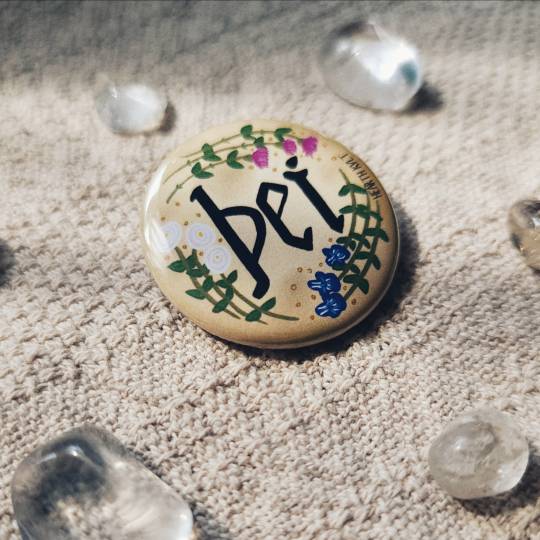
where are the nonbinary english lit/history majors and teachers who can still wear pronoun pins under our increasingly fascist education system
i made this for u
(i mean i made it for me mostly but that's just how the artistic process works babey)
it's based on illuminated manuscripts and the 1375 translation of william and the werewolf, which features the first recorded use of singular they in english
318 notes
·
View notes
Text
Alan Alda: [in conversation about the social evolution of words] which reminds me of the singular "they," which everybody is needing to get a little more familiar with, and more accepting of. You say a very interesting thing about how some of us have trouble accepting that "they went into a store and had a soda," where we're talking about "Mary went into a store and had a soda," you're talking about one person. But originally - or a long time ago - we said "thee" and "thou" and changed it to "you," which is- which was plural, and we don't have a problem with my talking to you and calling you "you," I don't need to call you "thou." And I don't say, "you is," I say "you are."
Valerie Friedland: I think it's really funny because if we look back 300 years - which often we don't do, and that's why we hate the things we say today - we could find the same kinds of complaints about using you as we can find using singular they today. So grammarians like Robert Lowth and Lindley Murray would complain about how it was ungrammatical to use "you" as a singular. and not only that but most people don't realize that "you" is actually objective case and not nominative case, which means in plain English it's not meant to be used for subjects at all, it's supposed to be used for objects.
"Ye" is actually a subject case. So when you had a subject saying "you did this," it would be "ye did this." Not only did we move "you" to the subject position, we also started making what was once plural, singular. and then to top it off we started using plural verbs with it. All of this happened before any of us were born, so all of us do it without any problems today. Singular "they" is essentially the same sort of shift, pronouns have always changed over time - in fact "they" is not the original one in English either, it was brought it in by the Vikings -- so now it's just a matter of getting used to this grammatical shift, because a lot of the time in our grammar in our head we have it linked to being plural. And so it's just a matter of adjusting our knowledge to say " oh it's actually also singular." Now I can use a plural verb and it's going to be like "you," and take a plural verb whether I'm talking about one "they" or two "theys."
#alan alda#clear + vivid#valerie friedland#singular they#this was in his last episode#supportive of the they/thems alan alda confirmed ❤#gender#language#queer stuff#queer language#me like: ooh if only one could have a whole episode about queering of language with alan
273 notes
·
View notes
Text
✨️Check out these linguistic fun facts:✨️
Fact 1: Singular they/them is used as a third person personal pronoun. Since when? Since the middle English period! Check this and this post for historical background on pronouns.
Fact 2: The use of singular they has been discussed for decades. Here’s a post about that.
Fact 3: According to those two studies singular they/them is widely accepted as a gender neutral third person pronoun in English (over 80%/70%). Check our post about it here.
Fact 4: they/them is not the only pronoun set non-binary people want to be referred with. Some use neopronouns or multiple sets of pronouns. Read more about neopronouns here.
Fact 5: Singular they/them needs to be integrated into language properly! If you want a helpful guideline, here's a post about that.
What is the ✨️fun✨️ part about these fun facts? Well look at the development and variety of the English language! It may not be interesting for everyone, but gender-neutral pronouns are linguistically very ✨️fascinating✨️
#linguistics#science side of tumblr#gender neutral language#pronouns#sciblr#they/them#nonbinary#english#english language#linguistics project#language#queer#they them#singular they#queer linguistics
117 notes
·
View notes
Text
Small words symbols: she, he, singular they pronouns
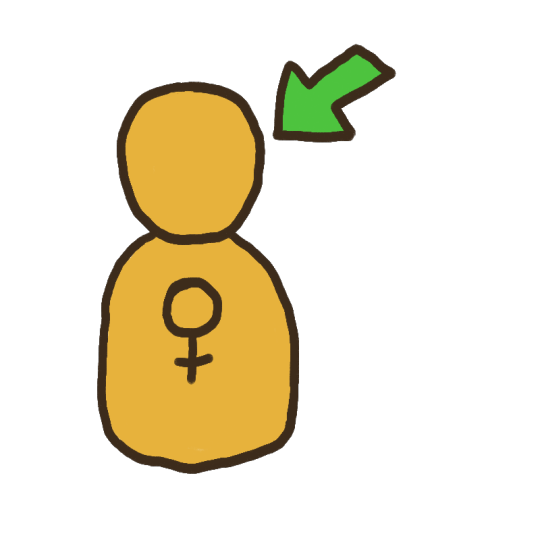
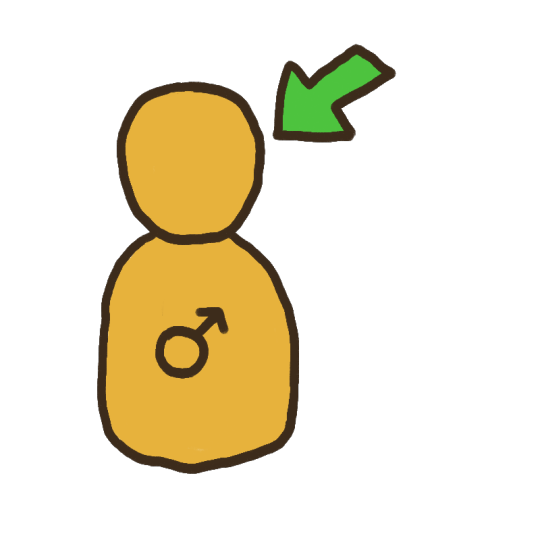
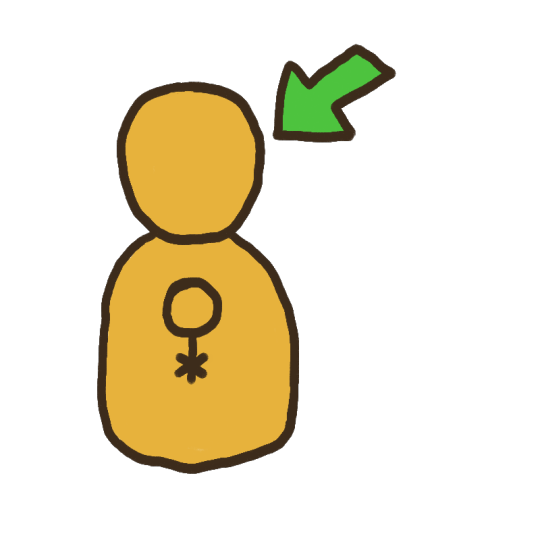
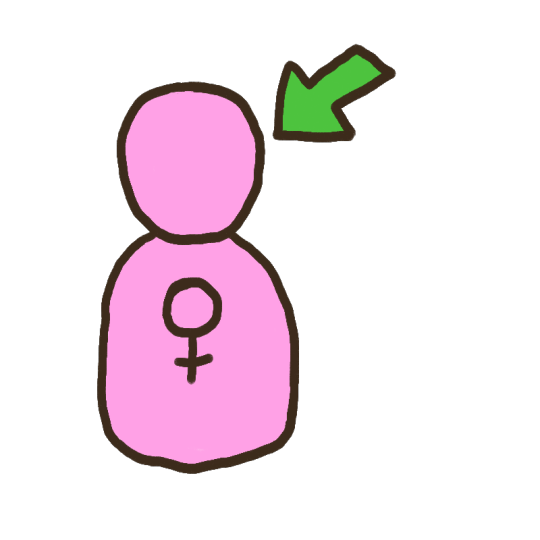
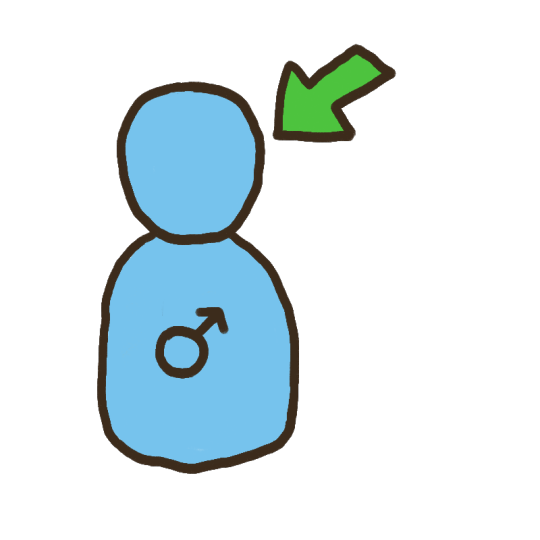
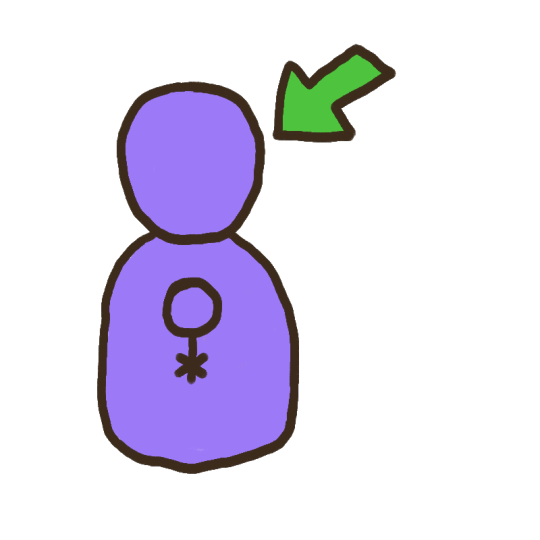
[ ID: A set of six emojis of a person with a green arrow above them, pointing to them. They are:
1) Warm yellow with the venus symbol on them.
2) Warm yellow with the mars symbol on them.
3) Warm yellow with the nonbinary symbol on them.
4) Pink with the venus symbol on them.
5) Blue with the mars symbol on them.
6) Purple with the nonbinary symbol on them.
/End ID ]
emojis/aac symbols for she, he and they (singular) pronouns. i didn't know what to for these but i needed them, so i tried. i will probably make different versions later.
also i know pink and blue are stereotypical colors but wanted to differentiate between the emojis better.
#kit.makes#small words#pronouns#she#he#they#singular they#she/her#he/him#they/them#singular they/them#queerness#aac symbol#emojis#emoji
13 notes
·
View notes
Text
Back in 2015 Taylor Swift got criticized for using they as an indefinite singular pronoun with somebody as its antecedent (THE HORROR 😱), despite the fact that this has been grammatical in English for 500 years.
Talk about a slow news day 🙄
24 notes
·
View notes
Text
I used to listen to people say singular they/them was difficult I thought, yeah fair, because you listen to the amount of trouble they have and you think singular they/them means "They is happy" and that's fair it's a fucking pain, bit unreasonable to expect people to say "They's my best friend"
And then it turns out they actually mean this. "They mean this." "Someone came and they are asking for you."
It's basically default non-known gender as far as usage goes. Really fucking simple
The most confusion you'll get is, "Fierro is happy because they are eating ice-cream." That's literally it. It's intuitive to anyone who has used English for long enough And I was thankful because this is what I did and wanted to do anyways because it struck me as intuitive and I didn't have to murder my grammar with "they is"
Ok on that note how on Earth did I manage to think singular they/them meant using they/them like they were singular pronouns and not plural in a sentence? From the way you hear about people bitching about it you'd think that was the case but am I this stupid
#pronouns#nonbinary#Queer#My posts#Hello worldly#I'm genderfluid actually#They/them#Makes sense#Lgbtq#Genderfluid#enby#singular they
11 notes
·
View notes
Text
APA STYLE GUIDE UPDATES:
if you use "he/she" to refer to a theoretical individual, then the they/thems and it/its get to do whatever they want for ever
(neopronouns get to do whatever too but like they didn't need permission)
4 notes
·
View notes
Text
Singular They
The singular they refers to using the pronoun “they” to refer to a singular person, or a singular identity, when a gender is not identified, specified, or of important context. It is primarily used in gender neutral context.
Examples:
The student raised their hand for the question
They continued to pick at their hood, making sure it obscured the face.
A construction worker can be a difficult job, they are required to heavy work.
History:
Singular they has been used since the 1300s, but there is evidence it may have perhaps been used even earlier. Around the 1800s singular they became popularized to be incorrect, due to the wide spread grammatical belief that they couldn’t be singular, and only plural. Around this time instead gender neutral “he” took over, which often was rarely used in gender neutral context.
This is change is believed to made due to the fact that many cultures at the time where patriarch centered, meaning men were wildly regarded working in all culturally viewed important workforces, such as scientist, religious figures, anything scholarly, and more. This more so ignored the fact that women still worked, and excelled in these fields when allowed.
Many people still even used the gender neutral they anyway, and even created several variations of gender neutral pronouns to use for writing, including Zie, Hir, and Em.
Overtime due to cultural connotations on the gender neutral he changing, singular they came back into popularity to be used once more to refer to a singular person in gender neutral setting.
Is it Correct?
In many stubborn literary cultures there is current argument about whether or not using they to refer to a singular is incorrect or not. Those who haven’t been properly keeping up with the contemporary changes in grammar, are likely to believe that singular they does not exist.
APA, Meriam-Webster, and Oxford English Dictionary have already come out to regard it as correct. It is now also wildly regarded that since usage of they as singular has existed for a long time, we can’t ignore it’s potential usage in modern context to also act more inclusively.
Singular they can do a very important job of bridging a gap in English that has existed for a long time, which is a stubborn disregard for variations in gender. Whether it be interpreting a workforce as a men’s only place, or outright ignoring the existence of non-binary peoples and other genders.
Overall it is considered even in professional levels to use singular they now, but it will not be regarded as incorrect to use prior forms of gender neutral writing.
#writing#writing advice#writing advise#pronouns#writing pronouns#english#singular they#grammar#grammar history#writing grammar#linguistics
24 notes
·
View notes
Text
every single time i see "he or she" or "him or her" or "his or hers" written out i can feel my brain cells imploding. it just sounds so stupid to me.
please just use singular they/them pronouns. spare my few remaining brain cells from a fiery doom.
#it's just one of those things that i get irrationally angry about#they/them#singular they#pronouns#agender#nonbinary#stochastic ramblings
4 notes
·
View notes
Text
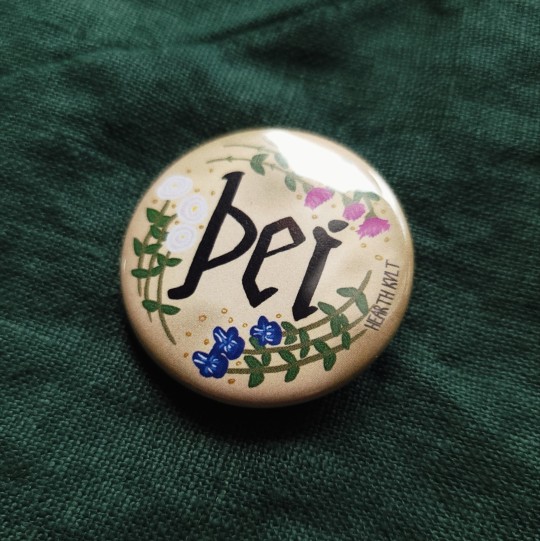
ye olde pronoune pinne dropping in the shop update next Friday (9/29) for Hearth Kvlt!
i saw a photo of the page w/ the earliest recorded use of singular they in english, back when it was still spelled with a thorn (þ), and made these in a mad dash of inspiration
but will i make other pronoun editions? 🤷 only time will tell
49 notes
·
View notes
Text

“You must not torture yourself with pointless guilt. If there is someone that you love, then tell them.”
Saga of the Swamp Thing #34, Rite of Spring, March 1985
Writer: Alan Moore, Artists: Stephen R. Bissette, John Totleben, Tatjana Wood
#singular they#1985#1980s#alan moore#steve bissette#john totleben#tatjana wood#swamp thing#saga of the swamp thing
6 notes
·
View notes
Video
youtube
This was in my rec list on YouTube. It’s excellent. Knew most of the stuff. Also learned some stuff.
Properly Closed Captioned in English.
19 notes
·
View notes
Text
for those that argue against singular they
some people love to say that they refers to multiple people. a popular retort is that singular they predates singular you. on that topic i very much enjoyed finding this source: https://public.oed.com/blog/a-brief-history-of-singular-they/
singular they dates back at least since 1375, nearly 650 years ago. you as singular was argued against in 1660.
so roughly we can say that singular they predates singular you by 300 years.
7 notes
·
View notes
Text
Themcel Flag

Themcel (theyncel, theircel, theincel, or theycel): a they/them celibacy.
#emcel#eycel#theycel#themcel#flag#incel#volcel#celibacy#pride#flags#they/them#singular they#themself#their#themselves#theirs#themcelibate#themcelibacy#celibate#themcelibatary#celibatary#cel#pronoun#proncel#pronouncel
14 notes
·
View notes
Photo

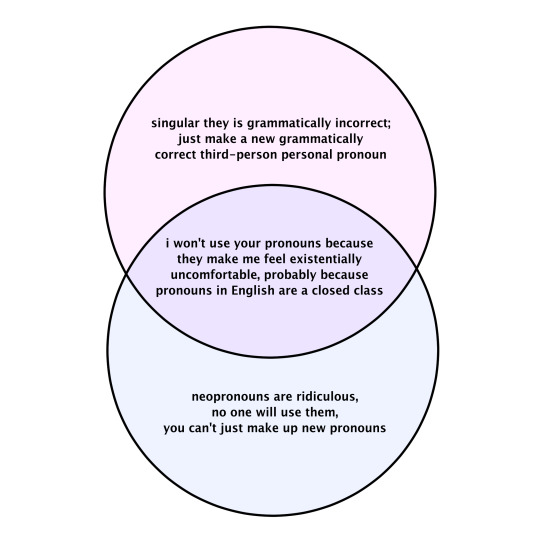
Based on futile Twitter conversations I've had today, here are some diagrams about the nonbinary pronoun situation.
Alt text:
Image 1
Cycle. Position 1: singular they is grammatically incorrect; just make a new grammatically correct third-person personal pronoun. Position 2: okay, i made this new set of pronouns, could you please use these for me instead? Position 3: neopronouns are ridiculous, no one will use them, you can't just make up new pronouns. Position 4: okay, singular they is really old and everyone already knows how to use it, can you use singular they for me? Arrow points back to position 1. Text in centre: i won't use your pronouns because they make me feel existentially uncomfortable, probably because pronouns in English are a closed class.
Image 2
Venn diagram. Circle 1: singular they is grammatically incorrect; just make a new grammatically correct third-person personal pronoun. Circle 2: neopronouns are ridiculous, no one will use them, you can't just make up new pronouns. Text in overlap: i won't use your pronouns because they make me feel existentially uncomfortable, probably because pronouns in English are a closed class.
26 notes
·
View notes